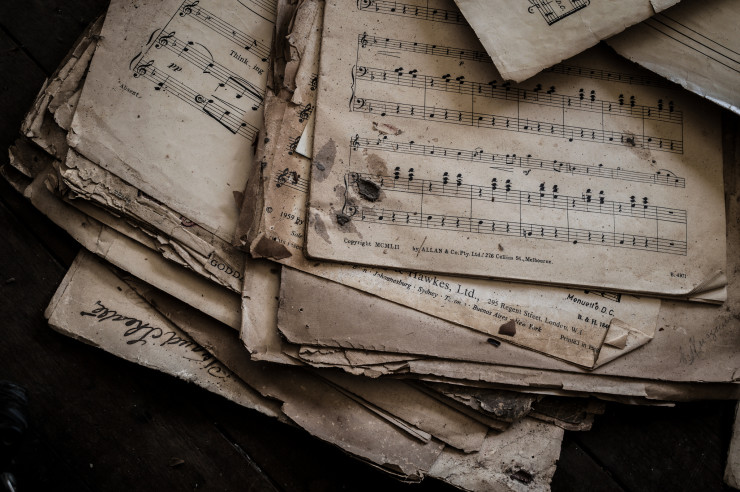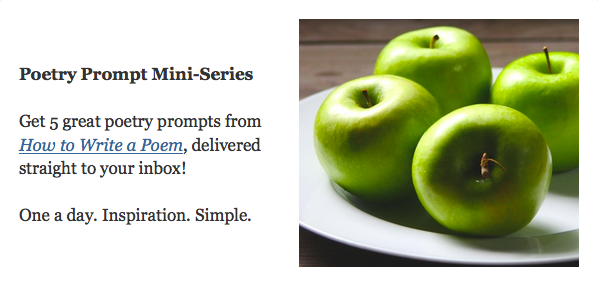
Fast forward to the 14th and 15th centuries, and many prominent composers such as Guillaume de Marchaut, Guillaume Dufay, and Hayne van Ghizeghem were well-versed in the form. Early rondeaux are usually found as additions in longer narrative poems, and separate monophonic musical settings survive to this day.
Eventually all good things must come to an end and after the 15th century, the musical rondeau went out of vogue and the rondeau became a purely literary form.
Try a Rondeau
Write a rondeau based on your favorite song. Follow the “aabba aabR aabbaR” rhyme scheme. Dancing is optional but always recommended.
Click to get 5-Prompt Mini-Series
Featured Poem
To help inspire your poetic flow, here is a recent poem from Andrew we enjoyed:
Pulse of the sea, feel of the foam
On face and hands. Reflected waves
Cast oscillating curves of blue
Into the inner mind. It calls,
And to its call I am as water,
Soft and mouldable. For it is me
As I wish I was. Bright, perfect,
And clear. A blue of passion, a
Bombardier blue, a sightless,
Blinding blue. And I can not resist
Nor do I want to. Within, the waves
Crash softly, whilst without
They capture curves of coast I’ve seen,
Only now caught in depths
That cry of fair aquamarine.
—by Andrew
Photo by darkday. Creative Commons via Flickr.
Browse more writing prompts
Browse poetry teaching resources

“How to Write a Poem is a classroom must-have.”
—Callie Feyen, English Teacher, Maryland
- Poetry Prompt: Misunderstood Lion - March 19, 2018
- Animate: Lions & Lambs Poetry Prompt - March 12, 2018
- Poetry Prompt: Behind the Velvet Rope - February 26, 2018

Donna Falcone says
Andrew, I love the way you have pulled in and painted with all the blues…. the ending is beautiful, and this, I think, is my favorite part:
And to its call I am as water,
Soft and mouldable. For it is me
As I wish I was. Bright, perfect,
And clear.
Andrew H says
Thanks very much. I enjoyed writing that one, actually, so I’m glad you enjoyed reading it. 🙂
Donna Falcone says
This is one of the things I love about Tweetspeak Poetry… always something new for me here, and always back linking to older, related pieces. I remember the Ghazal piece, too. I had never heard of a Ghazal before. The music clip is beautiful, Heather.
Heather Eure says
Donna, it makes us so happy to be able to introduce you to new and interesting things. Glad you liked the music, too. It was a challenge to choose just one song! 🙂
Rick Maxson says
What Will You Remember
What will you remember, when again
the sun will warm you, or the rain,
with some surviving sense of place,
will touch you like a tear upon your face
from a life once lived in joy and pain?
Like drops of water on a windowpane,
our lives converge and so are fain
to seem, like the swell and settle of the sea.
What will you remember?
All tossed in time, all love and war a skein;
the threnody we sang, or glad refrain
will come to touch us in our sleep,
like phosphorescence from the deep
and leave a dream we can’t explain.
What will you remember?
Donna Falcone says
Oh Richard… this is wonderful – so lyrical.
I love this part best – what a great word – phosphorescence:
will come to touch us in our sleep,
like phosphorescence from the deep
and leave a dream we can’t explain.
Richard Maxson says
Thank you, Donna! I’m not sure you can dance to it, but it is what came to mind.
Heather Eure says
Love it! Thank you for sharing this, Richard. You’ve captured the heart of the rondeau.
Richard Maxson says
Thanks, Heather!
Andrew H says
I like the form of this style – it really forces you to think!
I loved her once, when I was young
In days when songs were sweetly sung
To give her credit every way
Her lips would move, her hips would sway –
Oh, how by me her beauty far was flung!
But weary now is made my tongue,
As on the fields the petals thickly strung
Block out the healing sun shine of the day.
I loved her once, when I was young.
As per, the pendulum of time has swung
And shown me all the follies of the young.
She is gone now, and by no means I may
See where her path has gone, or where it lay.
But though our final bells have long since rung,
I loved her once when we were young.
Heather Eure says
Glad you decided to take on the rondeau. It’s a challenging form, trying to find a sound you don’t mind repeating plus finding enough word choices! You’ve done it! Thanks for sharing, Andrew. Nicely done.
Richard Maxson says
I like this Andrew. You did the Rondeau proud.